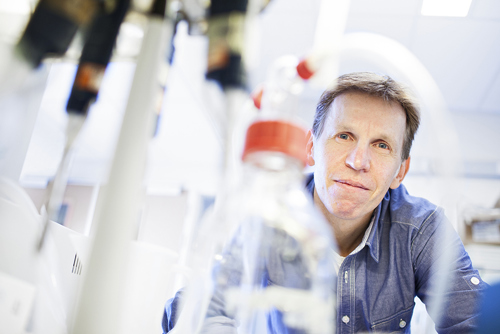Prestigious Louis-Jeantet prize for NKI immunologist Ton Schumacher
26 jan. 2021 13:01
Immunologist Ton Schumacher of the Netherlands Cancer Institute receives the honorable Louis-Jeantet Prize for translational medicine. This is a prestigious Swiss science award. He shares the prize with Jerome Galon of the Institut National de la Santé et de la Recherche Médicale in Paris. Both scientists will receive the prize for their work in which they have described the role of the immune system in the fight against cancer.

The immune system is the body’s defence mechanism: it usually protects the body from the harmful effects of pathogens or abnormal cells, including cancer cells. Jérôme Galon and Ton Schumacher have made seminal contributions to the understanding of how the immune system recognises cancer cells and to the understanding of the antitumor activity of novel cancer immunotherapies.
In recent years, it has become apparent that our immune system can control the outgrowth of cancer. A fundamental question that stems from this observation has been how the human immune system can distinguish cancer cells from healthy body cells and how an improved understanding of the tumour microenvironment, in particular the interaction between the tumour and the host’s immune system, can be used for diagnostic purposes.
NeoantigensTon Schumacher uses a technology-based approach to analyse immune function. Through development of novel assay systems, his research group has made it possible to describe with unprecedented depth which antigens are seen by the T cells that infiltrate human tumours. Schumacher and co-workers subsequently used these technologies to demonstrate that T cells in human cancers, such as melanoma and lung cancer, frequently respond to newly formed antigens (“neoantigens”) that arise as a consequence of DNA mutations.
First evidence
His research provided the first evidence that immune checkpoint blockade, the most widely used form of cancer immunotherapy, can increase the capacity of the T cell-based immune system to recognize such neoantigens. Finally, the observation by Schumacher and others that T cell-based cancer immunotherapies show the most profound activity in cancer types with large amounts of DNA damage provides independent evidence for the role of cancer neoantigens in human tumour control and has inspired the development of neoantigen-directed cancer therapies.
Ton Schumacher and Jérôme Galon have opened a new view of cancer, in which the role of the patient’s immunity is better appreciated and characterised. Together, their research provides patients with improved cancer diagnosis and novel opportunities for therapeutic intervention.
Both Jérôme Galon and Ton N. Schumacher have received numerous prizes, including the European Inventor Award in Research (Jérôme Galon) and the Stevin Prize (Ton Schumacher). They both received the William B. Coley Award in 2010 and 2016, respectively.
Jérôme Galon and Ton Schumacher will use the prize award to further understand the immune microenvironment during tumour transition and to predict which tumour antigens are recognized by T cells, in order to achieve novel diagnostic and therapeutic opportunities.
THE LOUIS-JEANTET PRIZES
Every year, the Louis-Jeantet Prizes distinguish leading-edge researchers who are active in the member states of the Council of Europe.
As one of the best-endowed awards in Europe, the Louis-Jeantet Prizes foster scientific excellence. They are not intended solely as the recognition of work that has been completed, but also to encourage the continuation of innovative research projects. When the research being recognised is close to practical applications for combating illnesses affecting humankind, one of the Louis-Jeantet Prizes converts into a Jeantet-Collen Prize for Translational Medicine, supported by generous donations from the Désiré Collen Stichting.
Established in 1986, the Louis-Jeantet Prizes have thus far been awarded to 96 researchers: 27 in the United Kingdom; 17 each in Switzerland and Germany; 15 in France; 4 each in Sweden, Italy and the Netherlands; and 2 each in Austria, Belgium, Finland and Norway. Among the 96 prize-winning researchers, 14 have subsequently won the Nobel Prize for physiology or medicine, or the Nobel Prize for chemistry.
Since 1986, a total sum of more than CHF 60 million has been awarded by the Foundation to the 96 prize-winners for the continuation of their work.
THE LOUIS-JEANTET FOUNDATION
Founded in 1983, the Louis-Jeantet Foundation is the legacy of Louis Jeantet, a French businessman and a citizen of Geneva by adoption. The Foundation’s aim is to move medicine forward and to defend the role and identity of European biomedical research vs. international competition. Established in Geneva, the Foundation is part of an open Europe and devotes its efforts to recognizing and fostering medical progress for the common good.
The Louis-Jeantet Foundation allocates some CHF 2.5 million each year to promoting biomedical research. It invests this sum for European and for local research projects. At the local level, the Foundation encourages teaching and the development of research at the Faculty of Medicine of the University of Geneva.